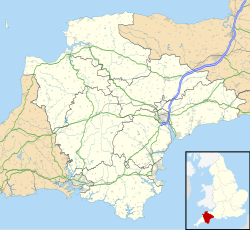This article needs additional citations for verification .(December 2009) |
| Chawleigh | |
|---|---|
 The Earl of Portsmouth | |
Location within Devon | |
| Population | 639 (2021) |
| OS grid reference | SS7112 |
| Civil parish |
|
| District | |
| Shire county | |
| Region | |
| Country | England |
| Sovereign state | United Kingdom |
| Post town | CHULMLEIGH |
| Postcode district | EX18 |
| Dialling code | 01769 |
| Police | Devon and Cornwall |
| Fire | Devon and Somerset |
| Ambulance | South Western |
| UK Parliament | |
Chawleigh is a village and civil parish in the Mid Devon district of Devon, England, situated just off the A377 between Crediton and Barnstaple. At the 2021 census, it had a population of 639, which was slightly less than the 642 recorded at the 2011 census. [1]
CHAWLEIGH, a parish and village on the south side of the Little Dart valley, 2 miles (3.2 km) S.E. of Chulmleigh, contains 850 inhabitants, and 5,478 acres (22.17 km2) of land; and has two cattle fairs, on May 6 and the Tuesday before the last Thursday in October. L.W. Buck, Hy. Reed, Cpr. Northcote, and the Rev. J. Russell have estates here, but about three-fourths of the parish belong to the Hon. Newton Fellowes, who is also lord of the manor, and patron of the rectory, valued in K.B. at £25. 14s. 2d., and in 1831 at £501, and now in the incumbency of the Rev. P.F. Clay, M.A., who has an ancient residence and 95 acres (380,000 m2) of glebe. The tithes were commuted in 1849 for £470. 5s. 10d. per annum. The Church (St. James,) has an embattled tower, six bells and a handsomely carved screen. The parish has 24A. of land, ten houses, and several gardens let for about £90, which is mostly applied in the service of the church. The Free School and master's house are vested with the trustees of the parish lands; and here is another school supported by the rector. The poor parishioners have about £6 yearly from various bequests."
— From White's Devonshire Directory (1850)
